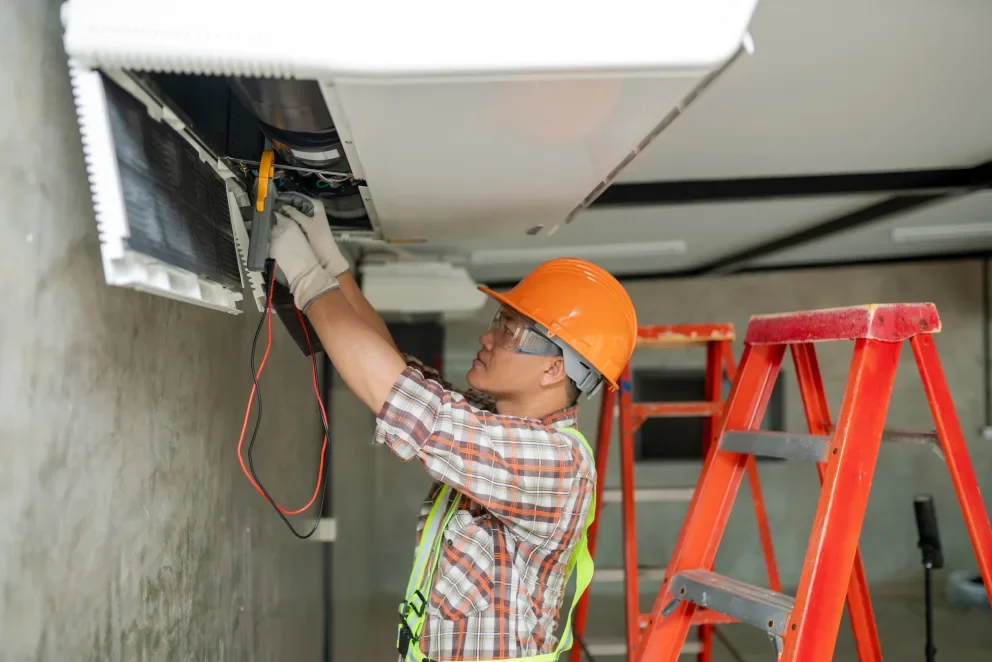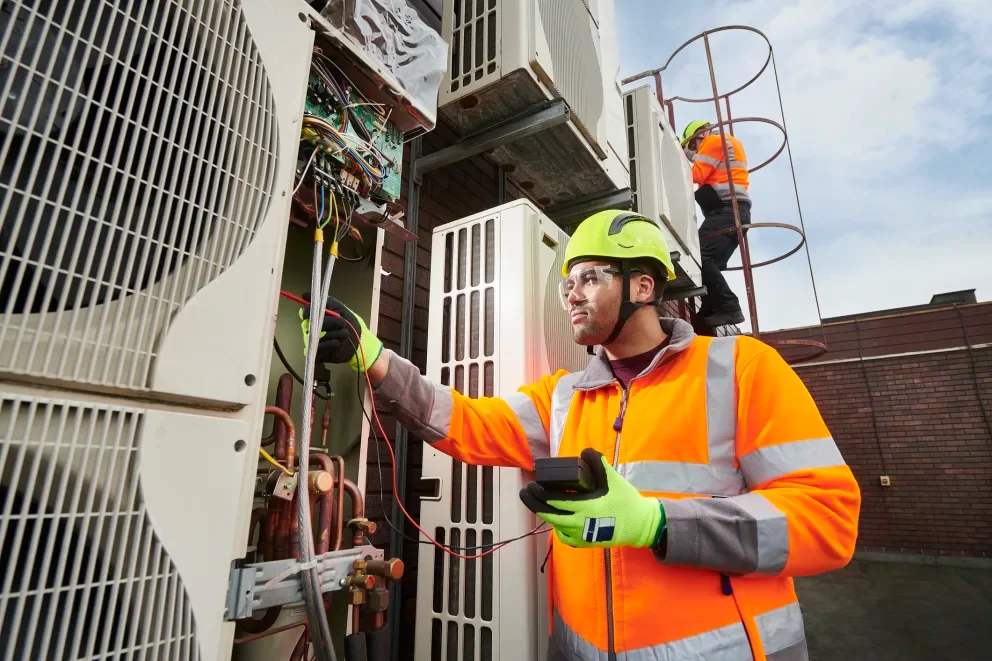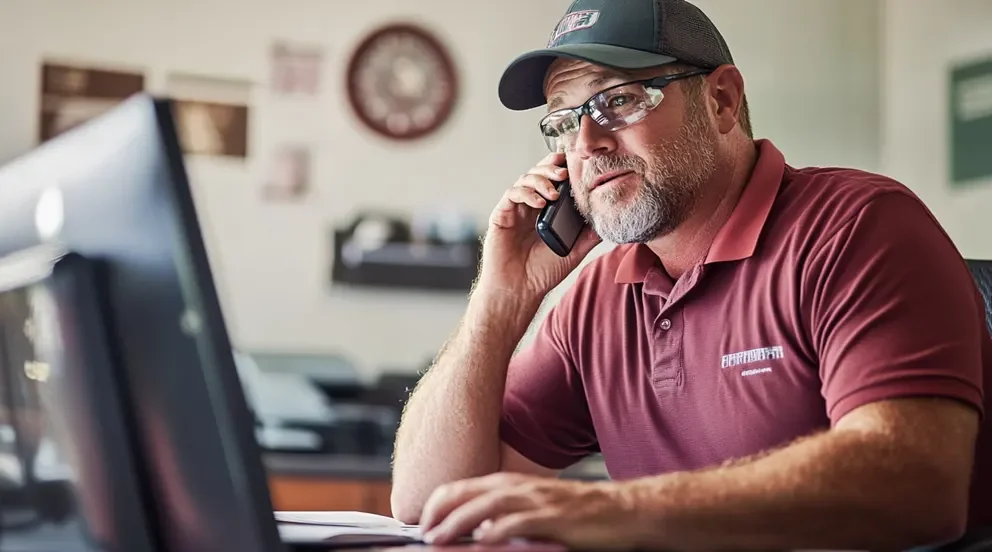What is HVAC Installation?
HVAC (Heating, Ventilation and Air Conditioning) installation is the process of installing an air conditioning system into residential or commercial buildings. This can involve fitting the pieces of an already purchased unit, incorporating existing components such as ductwork and controls, and connecting new units to a power source.
The first step in any HVAC installation is to properly assess the size of the room or area. This involves taking measurements related to square footage, design flow, required tonnage and other factors that will determine what kind of system is needed for optimal performance. Once the assessments are completed, it’s time to choose the right equipment for the job. There are a variety of units available on the market today with different features that are suitable for different types of applications.
Next comes preparation for installation which includes setting up a work area near the site where you can store tools and keep necessary paperwork handy while you work on-site. Other activities may include cutting holes in walls or ceilings if required, marking off areas where vents need to be placed, removing existing parts if they are incompatible with the new system, and laying down protective sheets to protect surfaces from dust or debris generation during installation.
The actual installation process begins when all preparations have been made. This usually involves assembling various components including mounting brackets for evaporator coils, connecting refrigerant lines through fittings such as flared nuts & elbows, wiring electric controls like thermostats & heat pumps etc., installing grills & dampers in ducts around vents according to code specifications and testing the entire unit before declaring it operational . During this stage a qualified technician should check all connections by running electrical tests with their appropriate instruments and make sure that all safety measures are met according to regulations outlined by governing bodies such as OSHA or ASHRAE (American Society of Heating Refrigeration And Air Conditioning Engineers).
Finally after all these steps have been completed successfully , it is important for technicians to perform regular maintenance checks every few months in order ensure optimal efficiency over time which would ultimately lead to extended serviceability from your air conditioning unit.
HVAC Installation is a complex procedure involving several intricate steps but when done correctly it can result in a reliable air conditioning system that not only performs at peak efficiency but also keeps your energy bills low in times when climate control demands more power than usual . As long as you find an experienced installer with sufficient qualifications & certifications, this process should be relatively quick & straightforward for homeowners or businesses alike.
What services do HVAC Installation companies provide?
HVAC installation companies provide a range of services related to heating, ventilation, and air conditioning systems. These services typically include the installation, maintenance, and repair of HVAC equipment in residential, commercial, and industrial buildings. Some specific services offered by HVAC installation companies may include:
- HVAC system design and installation
- HVAC system replacement and upgrade
- Routine maintenance and repair services
- Emergency repair services
- Indoor air quality testing and improvement solutions
- Duct cleaning and repair services
- Energy efficiency consultations and improvements
Each company may offer its own range of services based on its expertise and the needs of its clients.
What are the different licensing options for HVAC Installation companies?
The licensing requirements for HVAC installation companies vary from state to state and country to country. However, some common types of licenses and certifications that HVAC installation companies may need to obtain to legally operate include:
– Contractor’s license: This license is a general requirement for any construction-related business, and is typically issued by state licensing boards. HVAC installation companies will need to pass exams covering building codes, safety requirements, and other topics to obtain a contractor’s license.
– HVAC license: Some states require HVAC technicians and installation companies to hold a specific HVAC license. This may require passing an exam and demonstrating a certain amount of experience in the field.
– EPA certification: HVAC installation companies that work with refrigerants are required to obtain Environmental Protection Agency (EPA) certification. This involves passing a certification exam related to handling refrigerants safely and properly.
– Insurance: HVAC installation companies may also need to obtain liability insurance and workers’ compensation insurance to protect themselves and their clients in case of accidents or damage during installation or repair work.
It’s important to note that licensing requirements may vary by location, so it’s important for HVAC installation companies to research the specific requirements in their area.
What are the current most popular trends for commercial HVAC Installation businesses?
There are several current trends that are shaping the commercial HVAC installation industry. Here are a few of the most popular trends:
– Energy efficiency: With growing awareness of the need to reduce energy consumption and carbon emissions, more and more businesses are looking for energy-efficient HVAC systems. This includes systems designed for optimal energy efficiency, as well as regular maintenance to ensure that systems are functioning efficiently.
– Smart technology: The rise of the “Internet of Things” (IoT) has led to the development of smart HVAC systems that can be controlled remotely through internet-connected devices. This allows for more precise control over temperature and humidity levels, as well as energy savings through automation and data analysis.
– Indoor air quality: As businesses focus more on creating healthy and safe indoor environments for employees and customers, indoor air quality has become a top concern. HVAC systems can play a major role in improving air quality by filtering out pollutants and maintaining proper humidity levels.
– Sustainability: Many businesses today are looking for solutions that are both energy-efficient and environmentally sustainable. This includes HVAC systems that use renewable energy sources, such as geothermal or solar power, as well as systems that incorporate energy recovery technologies to minimize waste.
– Retrofitting existing systems: Rather than investing in brand new HVAC systems, many businesses are choosing to retrofit their existing systems with newer technologies and components to improve efficiency and reduce costs. This can involve upgrading components like thermostats and control systems, or adding features like demand-controlled ventilation to optimize energy usage.
In which areas are commercial HVAC installation businesses most likely to experience the greatest financial losses?
There are several areas in which commercial HVAC installation businesses are most likely to experience financial losses:
– Equipment failure: HVAC systems are complex and consist of multiple components that can fail if not properly maintained. When equipment fails, it can result in costly repairs or replacement.
– Emergencies: When an HVAC system breaks down unexpectedly, it can result in costly emergency repairs or even business downtime. This can lead to lost revenue and damage to customer relationships.
– Injury or property damage: HVAC installation work can be dangerous, and accidents can result in serious injury or property damage. This can lead to costly legal battles, settlements, or even higher insurance premiums.
– Fines and penalties: HVAC installation businesses must follow a variety of regulations related to safety, environmental compliance, and labor laws. Violations of these regulations can result in fines, penalties, or even loss of licenses or permits.
– Warranty claims: If an HVAC installation job is completed improperly or a defective product is used, it can result in warranty claims and potential litigation.
It’s important for HVAC installation businesses to take proactive measures to prevent losses in these areas. This includes regular maintenance and inspection of equipment, investing in safety training, and ensuring compliance with all relevant regulations.
Where do commercial HVAC installation businesses generate the most revenue today?
Commercial HVAC installation businesses generate revenue from a variety of sources. Here are a few of the most common areas where these businesses generate revenue:
– New construction: Many commercial HVAC installation businesses work directly with builders and developers to design and install HVAC systems in new construction projects, such as office buildings, shopping centers, hospitals, and schools.
– Building retrofits: Older buildings may require upgrades or retrofits to their HVAC systems to improve efficiency, comply with new regulations, or meet changing business needs. HVAC installation businesses can generate revenue by retrofitting older buildings with newer, more energy-efficient systems.
– Maintenance and repairs: HVAC installation businesses can also generate revenue by providing routine maintenance and repair services to commercial customers. This includes tasks such as cleaning coils, changing filters, and replacing worn-out components.
– Emergency repairs: When HVAC systems break down unexpectedly, businesses may require emergency repairs to get their systems up and running as quickly as possible. These services can be costly, but they provide a valuable revenue stream for HVAC installation businesses.
– Energy efficiency consulting: Some HVAC installation businesses specialize in helping commercial customers improve the energy efficiency of their buildings. This may include conducting energy audits, performing energy modeling, and recommending specific upgrades or retrofits that can help customers save money on their energy bills over time.
The exact revenue sources for commercial HVAC installation businesses may vary depending on the individual company, their area of expertise, and the needs of their customers.



